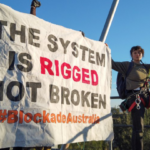Kiwis in Australian Immigration Detention: The Tragedy of Junior Togatuki

Like thousands of other Kiwis who make the trip across the Tasman Sea, Junior Togatuki came to Australia with his family as a young child in search of a better life.
But life in Australia was not easy for Togatuki, who found himself on the wrong side of the tracks during his teenage years, and was sentenced to a lengthy term of imprisonment at the age of 16 after taking part in an armed robbery.
But despite calling Australia home for nearly twenty years, our government made the decision to deport him back to New Zealand at the end of his sentence under recent amendments to the Migration Act.
After that decision, Togatuki, who suffered from anxiety and schizophrenia, found his mental state rapidly deteriorating.
Although being due for release, the government’s decision meant that Togatuki was required to remain in ‘de-facto immigration detention’ while awaiting deportation.
On September 12, just three weeks before he was to be deported, Togatuki was found dead in his isolation cell at the Goulburn Supermax Prison, having committed suicide using a razor blade.
In the days leading up to his tragic death, Togatuki had reportedly pleaded with Immigration Minister Peter Dutton to stop his deportation, saying that he had no family, friends, home or job in New Zealand and was ‘uncomfortable having the identity of a Kiwi.’
With around 200 Kiwis currently in detention in Australiam and seven facing deportation for committing offences, there are grave concerns that further tragedies could occur in the future.
The New Zealand government has called on Australian to address the situation, even in cases where Kiwis who are long term Australian residents have committed crimes.
Current Laws
Togatuki, along with other New Zealanders, was issued with a Special Category Visa; which enabled him to live and work in Australia for as long as he wished – as long as he remained a ‘person of good character.’
Special Category Visas were introduced by the Australian Government in 1994 to honour the close relationship between Australia and New Zealand. They allow eligible Kiwis to remain in Australia to live and work indefinitely – but they are, technically, temporary visas; meaning that holders cannot claim a range of welfare and other benefits.
In December last year, the Migration Act was amended to give the Immigration Minister new powers to deport non-citizens, including special category visa holders, if they have been convicted of an offence for which they were sentenced to a term of imprisonment for greater than one year.
Since then, it is estimated that 372 Kiwis have had their visas cancelled, with 119 being deported back to NZ this year alone. A large number remain in immigration detention awaiting deportation.
Police speculate that up to 1000 New Zealanders could be deported in the next five years.
Deporting Long Term Residents
The case of Junior Togatuki has angered many Kiwis, who argue that long term expats with limited ties to their home country should not be forcibly deported.
The widespread media coverage of Togatuki’s tragic suicide has even attracted the attention of NZ Prime Minister John Key, who has called the policy ‘too harsh’, and flagged it as an issue to be raised with Prime Minister Malcolm Turnbull in the near future.
New Zealand politicians are also concerned with the treatment of those who are awaiting deportation in detention centres and prisons around Australia.
It is reported that around 75 New Zealanders are currently being held on Christmas Island awaiting deportation, with many more expected to arrive there in the near future. However, the NZ government has not been given details about those being held, and their treatment in immigration detention. With the appalling conditions inside Australia’s immigration detention centres featuring heavily in the media, there are concerns that Kiwis could also be experiencing degrading treatment.
New Zealanders have foreshadowed a deterioration in the usually friendly relationship between NZ and Australia if these issues are ignored, with some saying that it displays ‘contempt’ towards New Zealand and its citizens.
But while the NZ government argues that its citizens deserve favourable treatment because of the historical relationship between the two countries, others contend that all non-citizens should be treated equally in the eyes of the law, and accordingly should be deported regardless of their birth country.
The NZ government has also voiced concerns that deportees could return to engage in criminal conduct back home, with a lack of family support and limited work and education opportunities in NZ increasing the risk of offending. The government also says that there are limited means of ‘monitoring deported offenders or obtaining reliable information on their risk before they returned.’
However, our Justice Minister Amy Adams has announced a new system that will list the New Zealan citizens that are being deported due to criminal activity. She has also proposed new legislation that will impose monitoring and conditions upon those being deported back to NZ.
But while these measures will increase transparency, they do little to ease the very real concerns about the treatment of those held in Australian detention centres.
It is argued that such considerations need to be addressed to prevent future tragedies – and that a proper assessment should be made of the new powers bestowed upon the Minister, some of which take power away from the courts and make one politician the judge, jury and executioner when it comes to deportation decisions.






